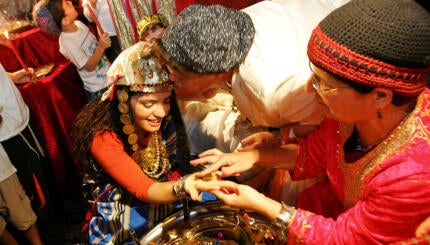One of my family’s favorite Sarah Silverman routines plays on the Jewish habit of always claiming one of our own: “You know that self-hating, Jew for Jesus, Holocaust denier—Jewish!” So when I emailed an article about the recent Louisiana court decision against marriage equality to my son, a law student, I noted: “You know that anti-equality, out-of-step-with-the-times-judge?—Jewish!”
Why do we do this?
Why does it matter?
I think our instinct to do this is an expression of our emotional sense of connection, of family with other Jews. Our tradition names this in the value kol yisrael aravim zeh bazeh: all Israel is responsible for one another. This is often interpreted as meaning we should care for one another but of course it also means that we must not do harm to each other. This was one reason the Louisiana decision was so upsetting to me.
To be honest, I think another reason is because it can be easier to be angry and frustrated about the obvious injuries to LGBT Jews “out there” than to take the time, energy and risks to focus on the ones right here in my own community. I want to hold Judge Feldman accountable for his actions, not just as an American but as a Jew because what he did is contrary both to U.S. law (as evidenced in the other recent federal decisions) but basic Jewish values. I can and will write him a letter to express those opinons. But I don’t know Judge Feldman, I’m not Judge Feldman’s rabbi or part of his community, and that’s probably the most I can do.
On the other hand, there is a great deal to do in the Jewish places I do live—both physically and virtually—the people I know, the groups to which I belong, the organizations to which I give
tzedakah
. And this is the most painful reason I get so upset when LGBT Jews are injured and excluded by other Jews—that 5775 is approaching and we have so far to go. I feel heartbroken at the failure of Jewish communities that can raise and honor individuals with a great deal of Jewish information but apparently few Jewish values.
During this High Holy Day season we often discuss
teshuvah
, the process of returning through acknowledging and making amends for the harm we have done ourselves and others. Seldom do we hear about its counterpart, tochachah, “rebuke” or “reproof,” the obligation to tell someone who has harmed you about the damage they have done (for the origins of this practice see Lev. 19:17-18). The reason for this is twofold. First, the Torah, (as well as modern psychology) knows how bad it is for both the individual and the community if someone holds a grudge. Second, withholding the information denies the offender the opportunity to do
teshuvah
.
I know from personal experience that tochachah can be much harder than teshuvah. It can also place a difficult responsibility on the victim. I also know from personal experience that it can be like coming out. You can’t always predict the outcome but it does personalize the abstract—I am what LGBT looks like, I am the human being who was hurt by your actions.
So if, like me, you were upset by Judge Feldman’s decision as a Jew as well as an American, I hope you’ll think about tochachah on behalf of LGBTQ Jews this High Holy Day season, regardless of your orientation or identification.
It doesn’t have to be a federal court decision—as rabbinic Judaism so profoundly understands, the small, daily actions that make up our lives can have a world changing impact. Speak with your rabbi or other synagogue leaders about how homophobia and transphobia hurt you and the Jewish community and how you need to hear that message from the pulpit. Talk to educators about supplementary school and day school curricula and hiring policies. Check out whether the bathrooms and membership forms are non-gendered and, if not, do something to change them. And, of course, go to www.keshetonline.org for resources that can have a lasting and transformative impact throughout your community.
May the coming year be one of compassionate love and wholeness for all of us.
Like this post?


